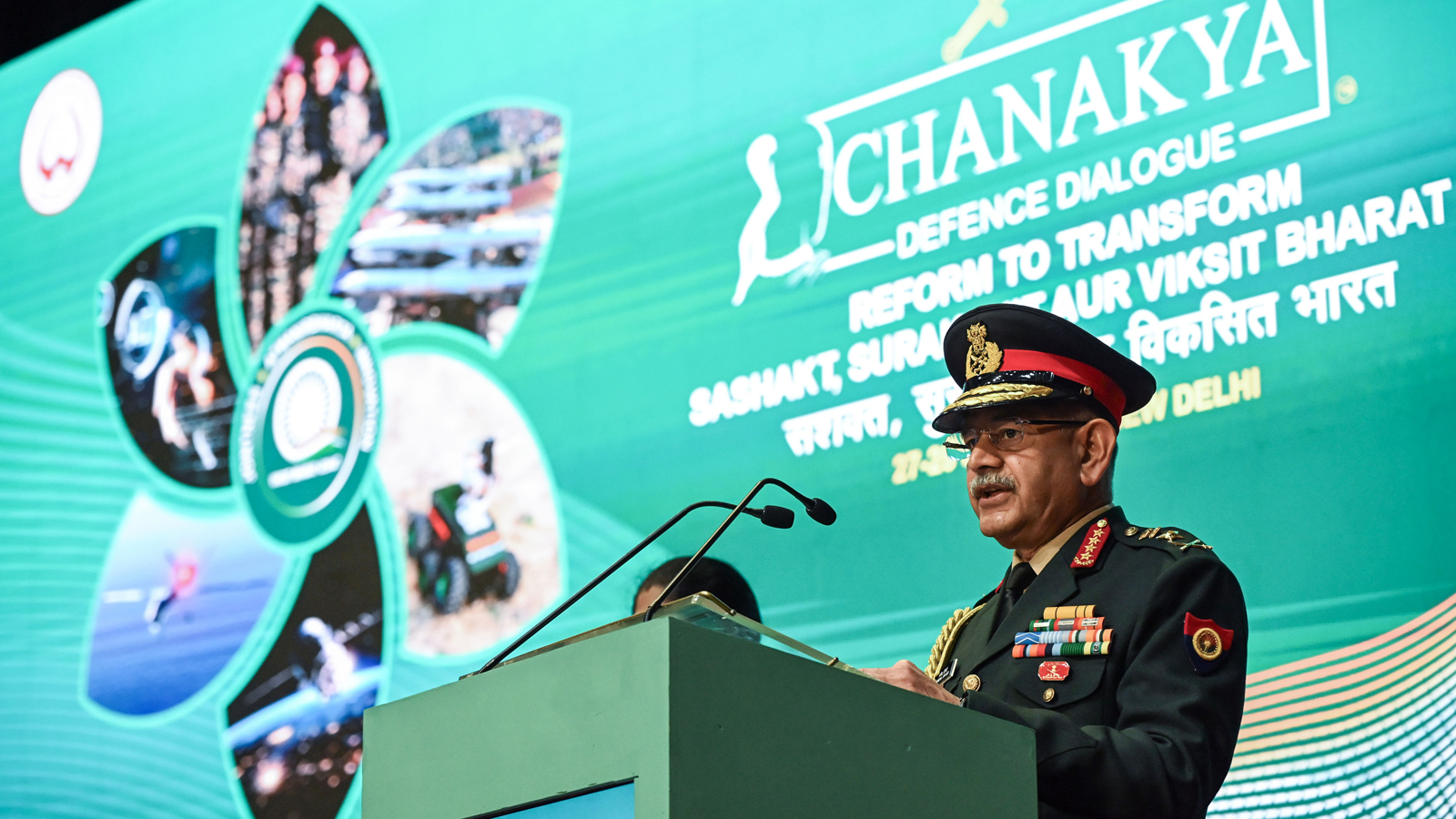Chief of the Army Staff General Upendra Dwivedi on Thursday detailed the Army’s three-phase transformation roadmap and identified “four key drivers for the next leap” at the Chanakya Defence Dialogue 2025.
The third edition of the Dialogue, organised by the Indian Army in partnership with the Centre for Land Warfare Studies (CLAWS), opened at the Manekshaw Centre in New Delhi. It brought together senior military leaders, global strategic experts, diplomats, policymakers, industry representatives and young scholars for high-level discussions on national security and defence transformation.
Delivering the keynote address, General Dwivedi said the Army’s transformation will unfold in three stages: HOP 2032 for accelerated transition, STEP 2037 for consolidation, and JUMP 2047 to realise an integrated, next-generation force design.
For next-generation reforms, he said the Army has identified four “key drivers”: deeper self-reliance through indigenisation, faster innovation in critical technologies, systemic adaptation of defence structures, and stronger fusion between the military, industry and academia.
President Droupadi Murmu presided over the inaugural session, while Chief of the Army Staff General Upendra Dwivedi delivered the keynote address.
In her special address, President Murmu praised the Indian Army’s role in safeguarding national security while also contributing to development in border regions. She said that India’s deterrence strategy is rooted in “moral clarity and responsible action,” reflecting the country’s civilisational ethos of Vasudhaiva Kutumbakam.
Highlighting the rapid evolution of modern warfare, the President said new domains – cyber, space, information and cognitive warfare – require armed forces that are technologically agile and future-ready. She appreciated ongoing Army reforms in doctrine, structure and capability development, and welcomed expanded opportunities for youth and women in the military.
Expressing confidence in the Army’s reform trajectory, she said that these efforts would play a key role in achieving the goal of a Viksit Bharat by 2047.
Defence Secretary Rajesh Kumar Singh reiterated that 2025 has been designated the Ministry of Defence’s “Year of Reforms.” He said that defence self-reliance is central to achieving Viksit Bharat 2047, noting that 75% of the capital procurement budget is now reserved for domestic industry, including a significant share for the private sector.
He emphasised that domestic defence manufacturing – backed by innovation, a strong GDP multiplier and rising exports – is now a strategic necessity.
NITI Aayog CEO B.V.R. Subrahmanyam said that India must navigate multiple global transitions – demographic, economic, technological, climatic and cultural – that are reshaping the world order.
With many advanced economies ageing and Asia becoming the driver of global growth, he said India must harness its demographic advantage, strengthen democratic institutions and pursue long-term security and development strategies anchored in technological self-reliance.
Prof. K. Vijay Raghavan, former Principal Scientific Adviser, highlighted the need for parallel investments across three timelines for lasting strategic advantage.
He called for short-term agility through startups and AI-enabled solutions, mid-term control over value chains and indigenous software systems, and long-term investment in foundational sciences such as advanced materials, biotechnology and cognitive warfare. He advocated a Defence Technology Council to accelerate mission-driven innovation for Viksit Bharat @2047.
Thematic sessions underline strategic priorities
Day One of the Dialogue featured three major thematic discussions: Operation SINDOOR: A Sovereign Strategic Victory; Changing Status Quo: Vitalising Defence Reforms; and Civil–Military Fusion: Drivers for Change.
These sessions brought together policymakers, military experts and industry leaders to discuss national security challenges and future pathways for defence transformation.
Chief of Defence Staff General Anil Chauhan delivered the concluding keynote for Day One, stressing that rapid technological advances – including AI, robotics, hypersonics and autonomous systems – are reshaping the character of war.
He said diminishing geographic constraints, the erosion of traditional sovereignty and rising nuclear proliferation require new doctrines for multi-domain operations. Emphasising the importance of intellectual rigour and self-awareness in military leadership, he said preparing soldiers for high-stakes conflicts is vital for securing Viksit Bharat @2047.
The event will continue on Friday with a special high-level session led by Defence Minister Rajnath Singh, who will announce key initiatives and outline major defence reforms. Additional thematic sessions will follow.














